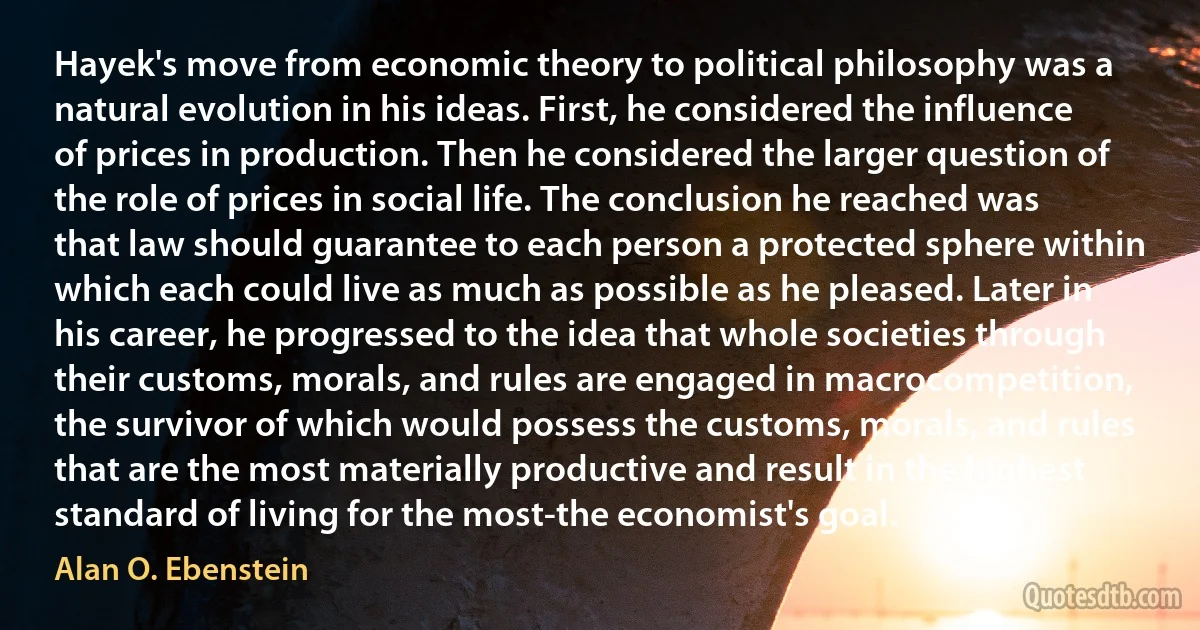
Hayek's move from economic theory to political philosophy was a natural evolution in his ideas. First, he considered the influence of prices in production. Then he considered the larger question of the role of prices in social life. The conclusion he reached was that law should guarantee to each person a protected sphere within which each could live as much as possible as he pleased. Later in his career, he progressed to the idea that whole societies through their customs, morals, and rules are engaged in macrocompetition, the survivor of which would possess the customs, morals, and rules that are the most materially productive and result in the highest standard of living for the most-the economist's goal.
Alan O. EbensteinRelated topics
evolution idea later law life living live move natural person possible production question result should customs RulesRelated quotes
My own views began to change before the next Nazi move, the occupation of Austria in [March] 1938.... No longer was it possible for me to believe that Nazism was a temporary aberration in German politics, that the good sense of the German people would soon take care of the Fuehrer, and that the greater danger to peace was French over-reaction to Hitler's moves, with the United Kingdom supporting such reaction. This feeling was replaced by the fear of aggressive war brought about by the policy of a German regime which now must be considered as evil and savage and an immediate menace to freedom and to peace. This regime could not be allowed to triumph in Europe, for its triumph would be a threat to free men everywhere.

Lester B. Pearson
Let true Christians then, with becoming earnestness, strive in all things to recommend their profession, and to put to silence the vain scoffs of ignorant objectors. Let them boldly assert the cause of Christ in an age when so many, who bear the name of Christians, are ashamed of Him: and let them consider as devolved on Them the important duty of suspending for a while the fall of their country, and, perhaps, of performing a still more extensive service to society at large; not by busy interference in politics, in which it cannot but be confessed there is much uncertainty; but rather by that sure and radical benefit of restoring the influence of Religion, and of raising the standard of morality.

William Wilberforce
The Nobel Prize confers on an individual an authority which in economics no man ought to possess.
This does not matter in the natural sciences. Here the influence exercised by an individual is chiefly an influence on his fellow experts; and they will soon cut him down to size if he exceeds his competence.
But the influence of the economist that mainly matters is an influence over laymen: politicians, journalists, civil servants and the public generally.
There is no reason why a man who has made a distinctive contribution to economic science should be omnicompetent on all problems of society - as the press tends to treat him till in the end he may himself be persuaded to believe.

Friedrich Hayek
The year 1844 saw the beginning of Marx' s friendship and collaboration with Friedrich Engels, whom he had already met briefly in Cologne. Engels had been through a similar spiritual evolution to Marx, though their early education was different. Born on 28 November 1820, Engels was the son of a manufacturer at Barmen (Wuppertal, near Dü sseldorf). He grew up in a stifling atmosphere of narrow-minded pietism, but soon escaped from its influence, leaving school before his final year to work in his father' s factory; in 1838 he was sent to Bremen to gain business experience. As a result of practical contact with trade and industry he soon became interested in social questions.

Leszek Kołakowski
I suggested before that the whole of economic history could be rewritten in terms of this gradual suppression of the primitive instincts by what we very mistakenly call "artificial” rules. Of course, they are not in the strict sense artificial. Nobody ever invented them. They were not the result of design. The new manners of conduct were not adopted because anybody thought they were better. They were adopted because somebody who acted on them profited from it and his group gained from it, and so these rules, without anybody under standing them-that is very important for the later part of my argument-without anybody understanding in what way they benefited their community, gradually came to be generally accepted.

Friedrich Hayek
